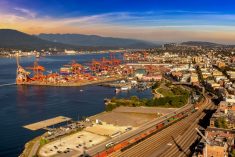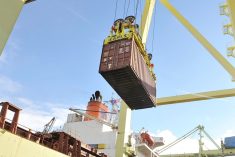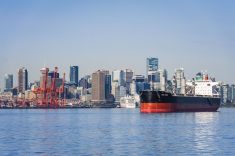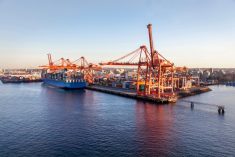A work stoppage at the Port of Vancouver is underway today, potentially impacting exports of coal, potash and beef although not bulk grain shipments.
The British Columbia Maritime Employers Association (BCMEA) said in a statement today that strike activity commenced this morning. BCMEA will also lock out “forepersons and other Local 514 members,” starting late this afternoon, “to facilitate a safe and orderly wind-down of operations.”
Late last week, the British Columbia Maritime Employers Association said it would lock out more than 700 foremen as a preventative step if the strike notice, issued by the International Longshore and Warehouse Union, wasn’t withdrawn.
Read Also

Federal budget shows remaining disconnect between agriculture, policymakers, panelists say
Canada’s agriculture sector is still disconnected from policymakers in some ways, say panelists at a CAPI webinar
ILWU local 514 president Frank Morena said in a statement that it only planned “limited job action” such as refusing overtime and accepting some technological changes, the Canadian Press reported.
The impasse comes after a long-simmering dispute over pay and working conditions, including concerns over automation, with each side accusing the other of bargaining in bad faith.
On Friday, Fertilizer Canada sounded the alarm over potential disruptions to fertilizer shipments and called for employers and the union to make a deal and avoid a work stoppage.
“We are once again on the brink of losing access to a critical trade corridor, and potash fertilizer will be one of the hardest hit commodities,” said Fertilizer Canada president and CEO Karen Proud in a statement, Friday.
Fertilizer Canada said a shutdown will cost the industry $9.7 million per day in lost revenue, could damage Canada’s reputation as a reliable trading partner, and jeopardize food security around the world.
“Disruptions also damage our trading relationships, providing an advantage to our competitors and potentially ceding market share to Russia and Belarus,” it said.
A 13-day strike last year disrupted more than C$6 billion in trade at Vancouver and Port Rupert. Fertilizer Canada said it cost the industry over $126 million, and led to a loss of “significant market share” to Russia in markets like Indonesia and Malaysia.
—With files from Reuters. Updated Nov. 4 to add details from Fertilizer Canada, adds details from BCMEA.














